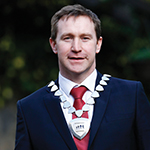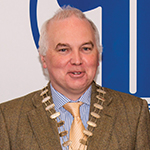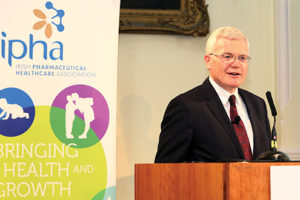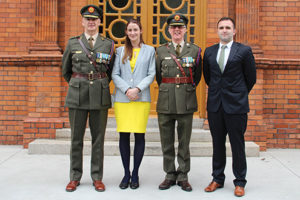2,8% increase in the acute hospital budget is inadequate and “completely insufficient”

Dr Emmett Kerin, NAGP President
Lloyd Mudiwa gets reaction to the HSE’s National Service Plan for 2017, and questioned whether doing ‘more with more’ in the health service will become a reality
Minister for Health Simon Harris has described the €13,948.5 million National Service Plan (NSP) for 2017 — an increase of €458.6m or 3.4 per cent — as marking the end of an era of asking health service staff to do more with less, and the formal return to a period of reinvestment in health service where the Government can ask them to do ‘more with more’.
While acknowledging there were needs and capacity issues, Harris said this meant he would not settle for excuses from health management.
HSE Director General Tony O’Brien, who hoped the HSE would not require supplementary funding in 2017, said 70 per cent of the budget (excluding drugs) would be taken up by workforce pay, reflecting that health delivery was mainly a people-dependent service.
The Plan focused on a decisive shift of service to primary care, he also highlighted.
But the three medical practitioner representative bodies immediately said funds allocated under the Plan were inadequate overall, particularly for acute hospitals and mental health, let alone for the transfer of care from secondary to primary care.
No respite
The IMO warned that insufficient funds had been put aside for the health budget, and that NSP 2017 would offer no respite from the carousel of hospital crowding, increasing waiting lists, vacant consultant posts, emigration of doctors and under-resourced GP services.
President Dr John Duddy said: “When the HSE itself starts pre-warning about budget shortages before the Service Plan is produced, you know you are facing a problem. Unfortunately, the HSE warnings are well placed this year and we have no confidence that patients will get the care and attention they deserve or that professionals will get the resources they require to do their jobs effectively.”
The Service Plan contained no significant proposals for either of the key challenges for 2017 — hospital ED crowding and new GP contract negotiations — Dr Duddy cautioned after its launch late last month (December 14).
“Unless and until we address the problems of bed capacity, the overcrowding we see in our EDs will continue, elective surgeries will be cancelled and waiting lists will get longer,” he said.

Dr Tom Ryan, IHCA President
While noting the Minister’s comments that some funds were available for a new GP Contract, Dr Duddy said there was absolutely no clarity around this number or even what was to be discussed in terms of any new contract. “The vision of moving services from the acute setting to the community setting looks increasingly unlikely,” he warned.
Dismissing comments also that the health budget was larger than ever, he noted: “People are living longer and their health needs are more complex. The increase in the health budget is unlikely to meet even this demographic change and has no scope to improve services. Neither patients nor doctors can have much confidence that things will improve. Let’s stop the idle chatter about how much we are spending and start concentrating on how much we need to spend.”
Primary care
The NAGP, which has previously submitted that a significant €500m transformation fund per year over five years was needed to shift to GP-led primary care, said the increase of €30.8m in the NSP did not reflect HSE commitment to shift to primary care, with inadequate investment made in the sector.
Comparing this budget increase in primary care to that of €118.4m for acute hospitals, which it said were still receiving most of the budget increase, the NAGP also stressed that additional diagnostic and surgical services in primary care required investment.
NAGP President Dr Emmet Kerin said: “GPs are ready and willing to provide a world-class GP-led primary care system if adequately supported. To make a real impact, we need serious investment. Both GPs, and the HSE, agree that this is the right long-term approach to provide the best care to patients and the best value for money to the Government.
“General practice is under-funded, and has been for nearly a decade. This budgetary increase will not deliver the ambitions outlined in the NSP. The increased budget of €30.8m must cover the ambitions outlined for all primary care services, including physiotherapy, speech and language therapy etc. There is no specific budget outlined to address the capacity and functionality of general practice,” he concluded.
Capacity constraints
Notwithstanding that acute hospitals were still receiving the biggest chunk of the budget according to the NAGP, IHCA President Dr Tom Ryan said a 2.8 per cent increase in the acute hospital budget was inadequate and “completely insufficient” to cater for existing patient demand, while the Plan failed to address the critical capacity constraints that have arisen from years of cuts in health sector capital expenditure.
Echoing Dr Duddy’s concerns around envisaged demographic increases and an ageing population, Dr Ryan said: “The root causes of the crisis in our public hospitals are inadequate acute and ICU bed capacity and insufficient operating capacity, which have not been addressed in this Service Plan.”
Not only, he said, was this leading to longer waiting lists, but also to the cancellation of essential surgery with increased frequency.
Obsolete equipment
Dr Ryan added that the acute health infrastructure was crumbling, with many hospitals attempting to treat patients with inadequate facilities and increasingly obsolete equipment. O’Brien earlier told IMT that it would require approximately €400m to replace such outdated equipment.
Dr Ryan also expressed disappointing that the National Service Plan did not provide funding to address the critical acute hospital and mental health capacity deficits, which were preventing consultants and front-line staff from treating patients without delays.
“I am also very concerned that despite promises to address the recruitment and retention of nurses and midwifery staff, no effort is being made to address the hundreds of vacant consultant posts that exist across the country and are having a massive impact on patient care,” Dr Ryan said.
Minister Harris announced a recruitment campaign targeting foreign-based Irish nurses returning home over the Christmas break, with O’Brien hoping the resumption of recruitment by the HSE and a homing instinct in the nurses would bring them back to these shores.
Nurse recruitment
The three-day nurse recruitment event organised by the HSE ended on December 30 with more than 190 nurses having presented for interview or career advice. Over 150 were interviewed and 102 offered permanent contracts subject to all necessary clearances and required documentation. At a similar event in Waterford, 13 nurses were offered permanent contracts, bringing the total to 115.
Commenting on the move, Rosarii Mannion, HSE National Director for HR, said: “The purpose of this specific recruitment initiative was to target people home for Christmas who may be thinking about returning to Ireland either immediately or later in the year. We wanted to send out the clear message that the HSE is open for recruitment again following the period of austerity we have come through over the last number of years.”
While she said she was well aware that many Irish nurses had to move to the UK and other countries to find work because of the public service recruitment moratorium, the “good news” was that the HSE was now hiring again. “The attendance over the last three days is evidence that nurses want to work in our health system, which is very encouraging. This recruitment event is the first of a number of such initiatives that will take place around the country in 2017 as we look to fill the 1,000 nursing vacancies we currently have. The last three days have been a great start.”
 Irish Medical Times Medical News for Healthcare Professionals
Irish Medical Times Medical News for Healthcare Professionals





